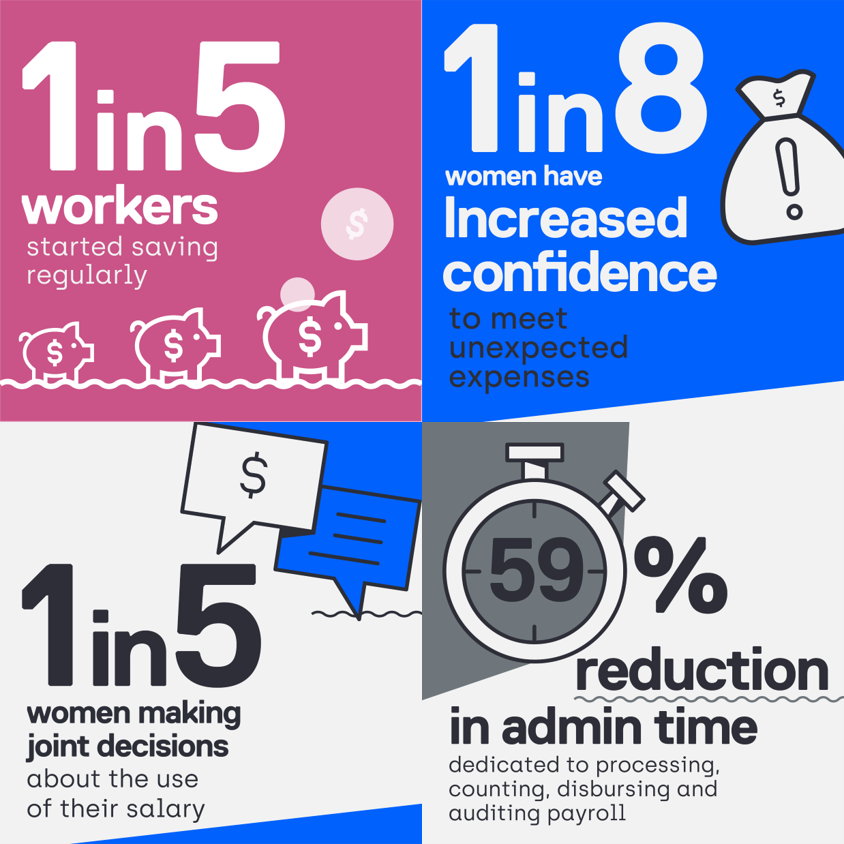This year’s International Women’s Day focused on recognizing gender bias and taking action for equality, principles that are always present in our work at HERproject.
In our HERfinance Digital Wages program in Bangladesh, developed in partnership with the Bill & Melinda Gates Foundation and designed to support garment factories making the transition from cash to digital payrolls, we found a tangible connection between tailoring programs to women’s needs and an increase in women’s financial inclusion and empowerment. When factory managers recognized and addressed women’s specific requirements, it led to a more successful transition, which in turn led to positive impact for both women and business.
We are pleased to share these results today in the report Digital Wages: Positive Impact for Women and Business. The program had a positive impact upon both factories and workers in the areas of increased efficiency, financial inclusion, and women’s empowerment.
1. Efficiency
- Administrative time spent on payroll was reduced by more than half.
- Worker production-time lost on payday was cut by more than three-quarters.
2. Financial Inclusion
- 1 in 2 women opened a mobile money account.
- 1 in 5 workers started saving regularly.
3. Empowering Women Workers
- Women feel more in control of their wages:
- 1 in 10 women stopped giving their salary to someone else to decide how to use it.
- 1 in 5 women (a 19-percentage point increase) started making joint decisions about the use of their salary.
- Women experienced increased confidence about their future financial health:
- 1 in 8 women expressed an increase in confidence in meeting expected expenses.
- 1 in 8 women expressed an increase in the confidence in meeting unexpected expenses.

We have seen that the transition from cash to digital wages has the potential to transform business and society. Based on the learning from the HERfinance Digital Wages program in Bangladesh, we have created two new tools, with support from the Mastercard Center for Inclusive Growth, to bolster the transition from cash to digital wages.
For managers: the HERfinance Digital Wages Toolkit helps employers and managers to digitize their payroll in a responsible way that considers the needs of all workers, particularly female workers.
For employees: the HERfinance Digital Wages Tech Learning Tool includes six training modules, each 15-20 minutes long, based on HERfinance Digital Wages training curriculum. It uses engaging films, quizzes and animations to support workers to increase their financial health and benefit from digital wages.
Moshrefa Banu is a quality inspector in the sewing section in a Dhaka factory. Her story is representative of the positive changes that some women have experienced by moving from cash to digital wages.
“It is much safer to use [mobile money]. It’s convenient and it saves time. I used to be worried about walking with cash, especially on payday, and when sending money. I felt uncomfortable going to the agent and waiting in line because there were men there. I would get ‘Eve teased.’ Sometimes I received disturbing calls at night because people in the line would overhear my number when I told the agent. I had to pay an extra 20 taka to send the money; now, it is free.”
Since receiving her wages via her mobile money account, not only does Moshrefa feel safer, she is also able to save some of her wages, with interest, toward her goal of buying a house.
Of course, digital wages can present technological and social challenges, and these need to be recognized and addressed for successful digital adoption to take place. We need a combined, cross-sector effort to promote responsible wage digitization, with focused contributions from businesses, financial services providers, and development organizations.
- Global businesses can collaborate with their suppliers, make the business case for the transition to digital wages, help shoulder some of the costs, and ensure a successful transition by focusing on the needs of workers, especially those of women.
- Financial service providers can prioritize expansion into a new market of financially excluded low-income people, particularly women, tailoring products and services to meet their needs.
- Local organizations can provide direct support for workers to gain financial and digital literacy, ensuring that the needs of female workers are taken into consideration.
- Development organizations can invest in unlocking market barriers, supporting the growth of financial services for low-income workers and championing gender issues within the market system.
The success of the HERfinance Digital Wages Program in Bangladesh has boosted HERproject’s plans for the future. We will be working to scale up HERfinance Digital Wages work across several more countries to enable many more workers and companies to benefit from digital wages, and we look forward to more of our partners joining us in this important work.
When accompanied by adequate support measures, a transition from cash to digital wages can increase business efficiency and transparency while bringing more people into the formal economy, thereby giving low-income workers—especially women—the tools to improve their lives. We hope global companies will embrace the responsible transition to digital wages as an effective means to advance financial inclusion, empower women, and build a just world.

